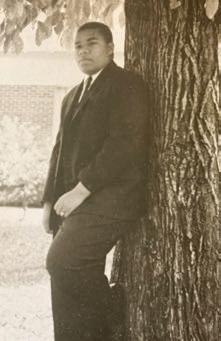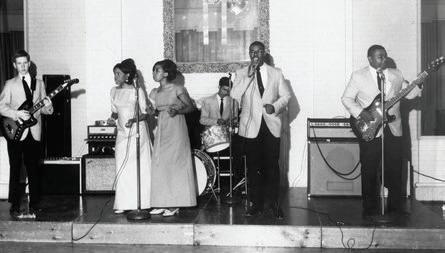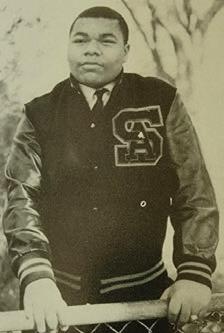
11 minute read
Alumnus Advances Diversity
Alumnus Spends Life and Career Advancing Diversity
By Jennifer Donovan
Several months in development, this article began with an email from the proud daughter of an alumnus. Teryl Warren reached out to share the story of her father, Jeremy Warren ’68. In the midst of a turbulent moment in Sewickley Academy’s recent history Ms. Warren felt it was important to remind the community that Sewickley Academy has a long history of prioritizing both academic excellence and societal progress.
Mr. Warren remains proud to be a graduate of Sewickley Academy. Photo credit: KLJ Studios
Considered a pioneer of his times, Jeremy Warren began his academic studies with Sewickley Academy in 1965, during the height of the Civil Rights movement in this country. He was the first African American student to enroll in the Academy and did so when the late James E. Cavalier was Senior School Director. In fact, a favorite story of Jeremy’s is that Mr. Cavalier often referred to Jeremy as his “Little Pioneer.” Attending Quaker Valley School District, a teenage Jeremy was encouraged by several members of his community to consider private school. A neighbor, who originated from Boston, gave him pamphlets for schools in Exeter and Andover, and he was drawn to the collegiate aspect of these schools. Then his scout master, who had connections with Sewickley Academy, recommended the school to Jeremy. SA was seeking to open its enrollment to African American students and had determined that a male student had the greatest likelihood for initial success. As Jeremy had originally been the only Black scout in his troop, his leader was confident that this was a challenge Jeremy could handle. He ended up taking entrance exams for Shady Side Academy as well as Sewickley Academy, but it was the warmth and influence of Mr. Cavalier, and the fact that Jeremy already knew many of the students from playing sports in the community, that led him to choose to become a Panther.
SUCCESS AND OPPORTUNITY AT SEWICKLEY ACADEMY
Jeremy enrolled at SA as a sophomore, along with a few other students from Quaker Valley. This year was also significant as the class of 1966 would be the first graduating senior class – the Senior School had just opened two years prior. Though entering as the only African American student, Jeremy recalls that the transition was not difficult because he already knew approximately 20 of the students in the Senior School. He added, “I was in academic classes, always in the top of my grade, so I always felt very secure of myself in terms of my academic performance and ability. I never had any real qualms.” Though he was an academically gifted student, he noticed a difference in the Academy students versus those in public school. “Everyone in the room was smart, so that pushes you to study and prepare more for class,” he said.
He went on to share the impact of several faculty members. “We had tremendous faculty at that time. My favorite teacher that I’ve ever had in life was Dr. (Mary Cooper) Robb. She was the first person that gave me the confidence that I could write. Math, I could knock it out, and the sciences were not a problem, but as far as writing, I didn’t get the feeling that I could write until she encouraged me to write an article for the Tentative Essential magazine. I wrote an article, and people really liked it. That gave me some confidence around my writing.” Outside of his classes, Jeremy was involved in baseball, wrestling, dramatic arts, chorus, and speech, and was a member of a popular local band, The Tempos, that performed at the senior prom. Many of his fondest memories center around those extracurricular activities. “We got into a battle of the bands contest at the Joseph Horne’s department store, and Mr. Cavalier agreed that I could get out of school for the competition. Afterward, I remember coming into school and Mr. Cavalier walking toward me asking how we did. I told him we won and he jumped up and down and said, ‘I knew you would.’” During his junior year, Jeremy got involved with the debate team, becoming team captain in his senior year. “Mr. Scott Carter (science faculty and debate sponsor) drilled me in preparation for the Pennsylvania High School Speech League tournament, and I won second place in the state,” Jeremy recalled. “It was a big deal for Sewickley to get into the competition and it has served me well. Everything I’ve done as a professional has involved public speaking so that experience was a great foundation.” Growing up, Jeremy was active in football, which SA didn’t offer, but he continued to play baseball for the school and was encouraged to try wrestling. “I loved it and the coach,
Jeremy Warren’s senior portrait, 1968.

Mr. (Ronald) Craig taught me so much about wrestling and life in general,” said Jeremy. “He, like so many other faculty, knew their subject, but was also very good at supporting you as you developed as a person.”
CHALLENGES OF A YOUNG BLACK MAN
While Jeremy’s overall experience at Sewickley Academy was positive, there were certainly points when the culture of the times was evident both at the Academy and later in life. For instance, speaking about the African Americans in his neighborhood, Jeremy said, “The thing that was difficult was that so many of the older people in the community were not interested in how I was doing, but would always ask ‘Hey Jeremy, how’s the Academy?’ I recognize the sense of pride they had that one of their own had gotten into the Academy, but it was unnerving that they didn’t inquire about me.” On campus, he recalls that “Academy kids would have parties on the weekends, and never invite me, but come in on Monday and talk about the parties. That was the way it was. At the same time, when I hung out with my friends from Quaker Valley that I’d grown up with, I didn’t talk about it [going to school at Sewickley Academy]. It was kind of like living in two different worlds at the same time.” He also remembered that the Black community could not go to the local YMCA, but instead visited the community center which happened to be built next to a sewage treatment plant. His education in the late 1960s and ’70s was at the height of the civil rights struggle. “I remember the night Martin Luther King was killed,” said Jeremy. “The next day, people were talking about it a little bit. I wanted to talk about Martin Luther King and Malcolm X, and all of my classmates were talking about the Vietnam War. The Vietnam War wasn’t as real to me as what was going on with civil rights.” Upon graduating from Sewickley Academy in 1968, Jeremy went on to Washington & Jefferson College (W&J), which he primarily chose because it was close to home and allowed him to play with his band that typically had gigs every weekend at colleges around the tri-state area. However, he was disillusioned at W&J because of the 1,000 male students, only 12 were Black. He remembered, “We were very isolated. Only two fraternities welcomed Black students.”
While he played baseball and stayed at W&J for a few years, he ultimately transferred to the University of Pittsburgh. Of his experience at Pitt, Jeremy said, “It wasn’t quite what I would’ve liked, but at that point I was married with a baby on the way. I worked full time at night, took care of the baby in the mornings while my wife was at work, and then I’d go to class. I did this for a year and a half before starting graduate school.” He added that his father was his role model having worked two full-time jobs for 30 years and instilling in Jeremy the value and importance of working to achieve something.
CAREER DEFINING PROFESSIONAL EXPERIENCES
After college, Jeremy began his career working in law enforcement. “Probation officer, social worker, and school teacher were the jobs that Black kids took after college,” Jeremy explained. “That was where we fit in. Those were the jobs that were offered to us because we were Black.” Always a hard worker, Jeremy strove to make a difference as a probation officer. “I started with 100 kids and after two and a half years, I had the caseload down to 20. That was me getting involved with them and keeping them away from stealing in stores and cars. I worked with the judges to get them sentences that would get them home detention instead of [the juvenile detention center]. It was what needed to be done. I wasn’t a great martyr, but these were kids that I liked and most didn’t have fathers at home to guide them. I would be right there with them at tough times, like in court. They knew I could be compassionate but tough, and they appreciated that because a lot of them didn’t have that.”
Academy kids would have parties on the weekends, and never invite me, but come in on Monday and talk about the parties. That was the way it was. At the same time, when I hung out with my friends from Quaker Valley that I’d grown up with, I didn’t talk about it [going to school at Sewickley Academy]. It was kind of like living in two different worlds at the same time.”

The Tempos, Jeremy Warren’s band, performing at the 1968 Sewickley Academy Prom at Allegheny Country Club.
After serving as a probation officer, Jeremy was hired on the production floor of the Corning Glass Works plant in Charleroi, Pennsylvania, where he was eventually promoted into human resources. At the time, the plant employed approximately 2,000 people, 60-70 of whom were managers or supervisors, and of those managers, approximately five were Black. It was the late 1970s, and Jeremy was requested to speak with the plant manager who had received a letter from employees who were “tired of all the Blacks in management.” That evening, a friend and coworker returned home to find a cross burning in his Washington, Pennsylvania yard. Though Jeremy did not have a similar experience, the plant manager assigned guards to their homes for a week.
Jeremy moved on in early 1981 to work as human resources manager for Levi Strauss & Company in Jackson, Mississippi. At the time, he was the only Black manager in the plant and was sometimes shocked by what he heard at work and in the community. When he inquired with senior management, he was told, “that’s just the way we talk down here.” He also recalls seeing highway signs featuring racial slurs.
After three years, Jeremy was promoted within Levi Strauss and moved to Knoxville, Tennessee, where he was a human resource development consultant. He mostly traveled throughout the state as well as through Georgia, Virginia, and Texas in order to train managers in change management, effective meetings, team development, and facilitating conflict resolution. That experience led Jeremy to California in 1998 working for Stanford University as the Manager of Training and Development. He recalls that they were “very sophisticated with their racism.” When the school was in need of a new human resources director, Jeremy filled the position for approximately eight months during the hiring process. While meeting with the provost, he was asked why he hadn’t applied for the role as he was doing a great job at the time. “I told the provost that, to be honest, I didn’t believe that Stanford was ready for a Black HR director,” Jeremy said. “I explained that we’d had Black people make application for the job who were better qualified than I was and the committee just tossed them aside. I didn’t need to see any more than that.” Though the provost was shocked, he thanked him for his honesty.

Jeremy Warren as a Senior, taken from p. 26 of the Sewickley Academy yearbook, Volume XII, 1968.
THE RIGHT TIME TO SHARE HIS EXPERIENCE
In 1992, Jeremy launched his own company to benefit others with his knowledge and experience. Specializing in strategic planning, organizational change, work restructure, and people development, he supported major organizations such as Shell, UC Berkley, and UC San Francisco, among others, until his retirement.
Jeremy even spent an additional 12 years with Levi Strauss as a consultant where he was heavily involved in facilitating diversity work. “It’s amazing how it has evolved,” Jeremy recalled of his consulting experience. “When I first started getting involved with affirmative action it was more or less sensitivity training, and then people began to recognize that there was more to it. So it evolved into management of diversity and valuing differences. We have not always valued differences and people in this country are finally beginning to understand that it’s necessary, but it takes time because you’re dealing with people’s values.” Perhaps the encouragement and compassion Jeremy felt as a new student at Sewickley Academy set him on a path to turn his challenges into learning opportunities for others. He has learned to value the significance of what is happening in the world in general, and while we can all play a part, we need to understand where we fit in. “If you’re singing baritone, you’re not going to be singing lead.” It is the leaders who need to support and spread the message of diversity, equity, inclusion, and belonging. Mr. Warren knows that the leaders of tomorrow just may be originating from Sewickley Academy. “What SA does is a tremendous job of educating kids,” he proudly said. “I can remember so many experiences that I had that really helped make me who I am today.”








